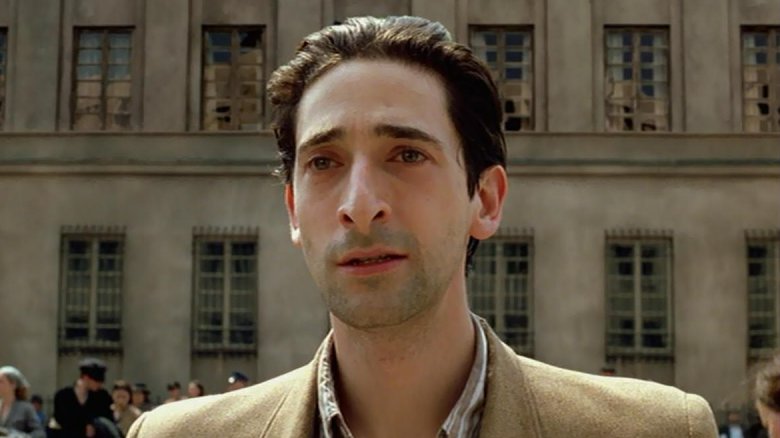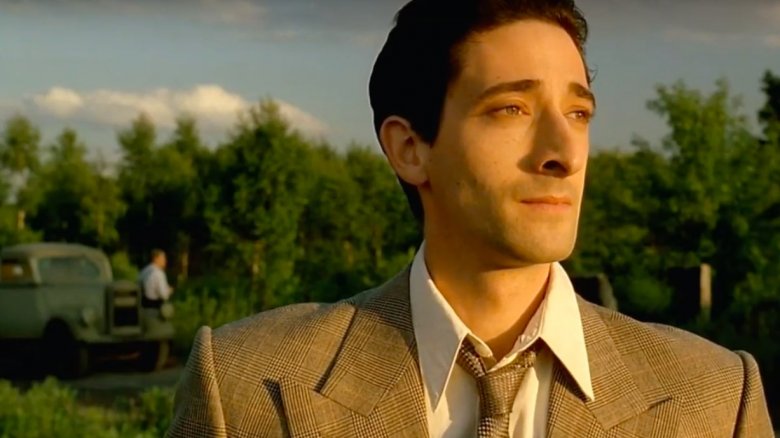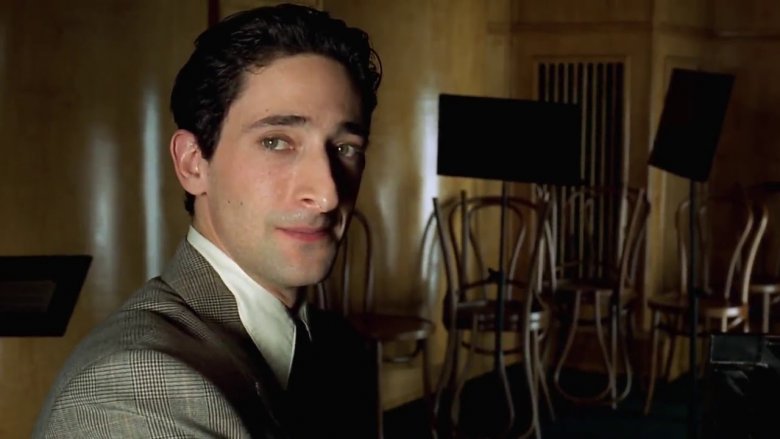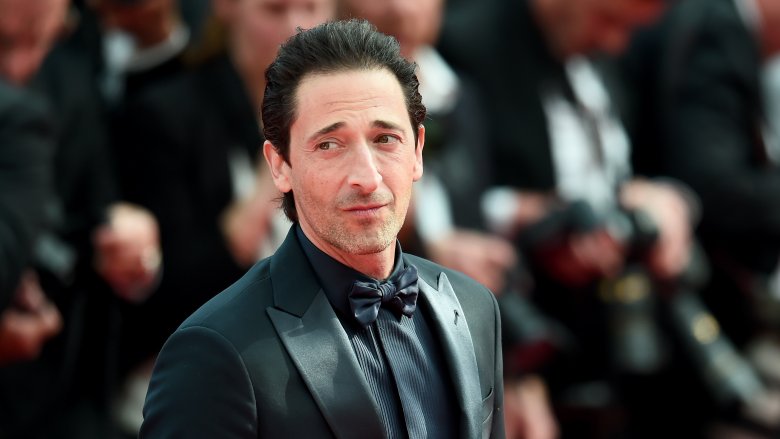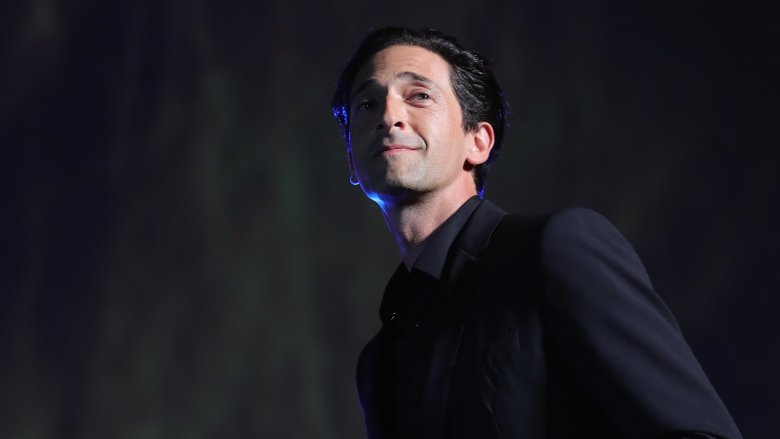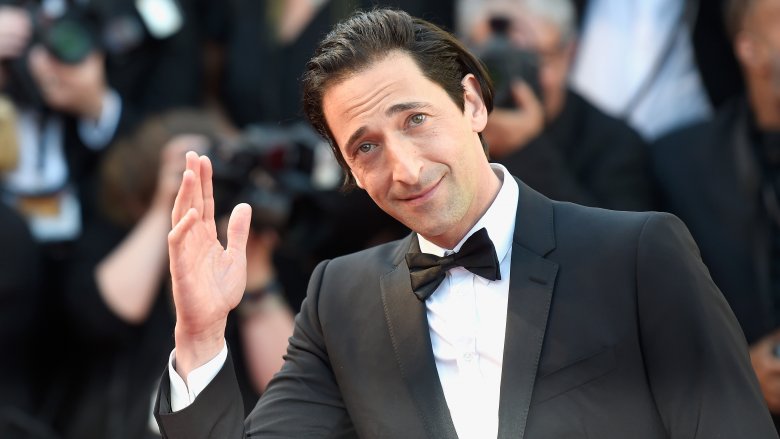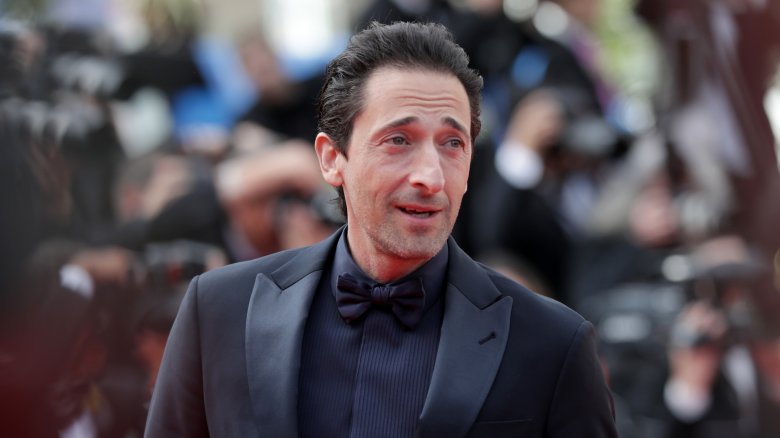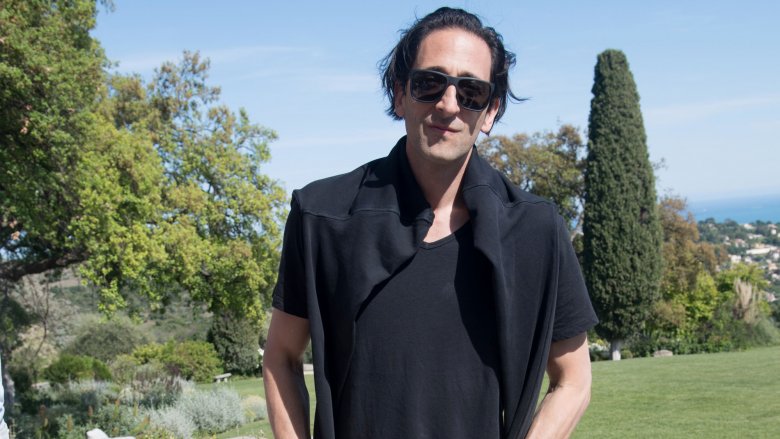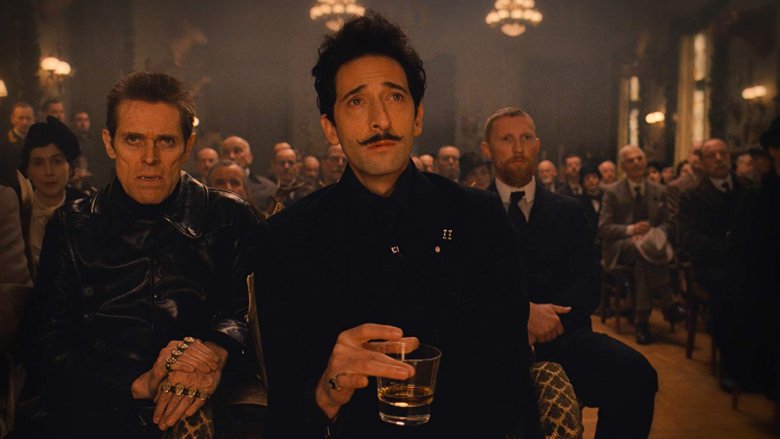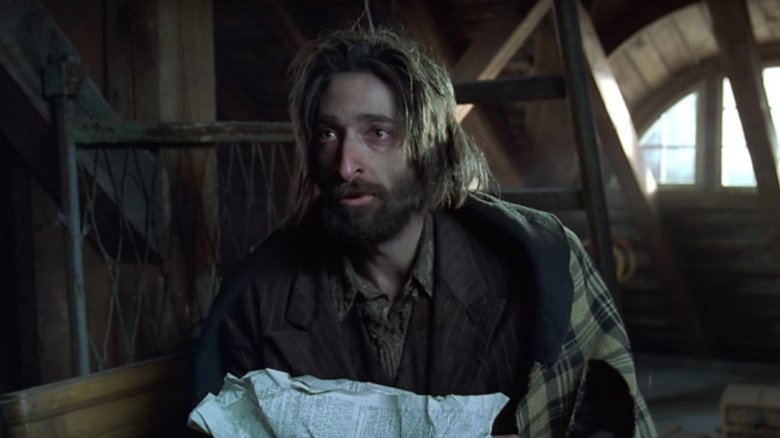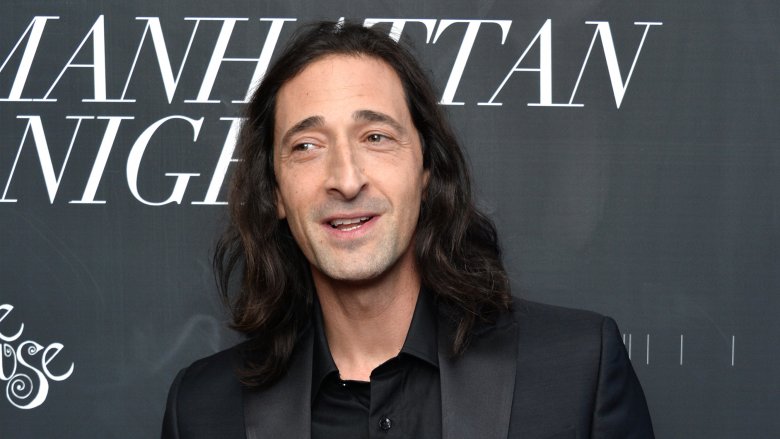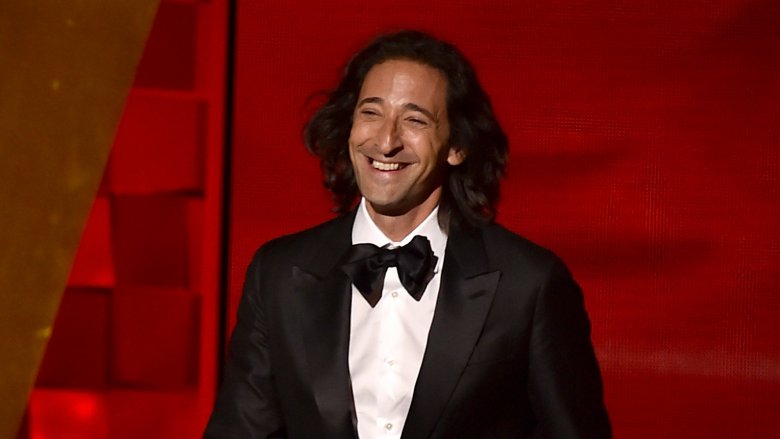Why Adrien Brody Was Never The Same After The Pianist
Before landing the leading role of Wladyslaw Szpilman in The Pianist, Adrien Brody had been acting for over a decade without much recognition. But this was the film that would turn his life around. Brody was universally praised for his portrayal of Szpilman, a Jewish pianist who was forced to hide in Poland's Warsaw Ghetto during World War II. At 29, Brody became the youngest man to win the Academy Award for Best Actor.
Being part of a film like The Pianist changed Brody's life forever. He went from working in relative anonymity to being an Oscar-winning star. Plus, he'd just committed a significant amount time to a role that demanded absolutely everything from him. After that experience — and accepting that he could never go back to the private life he had before — Brody had a whole new outlook. What did Brody go through to bring Szpilman's story to life in The Pianist, and why does it still affect him years later? Here's why Brody has never been quite the same since starring in The Pianist.
Adrien Brody went really far with the method acting
In order to step into Szpilman's shoes, Brody dove head first into the world of method acting. He knew that he could never fully understand what the real-life Szpilman had experienced, but he had to try his best to get inside his head. The first step? Actually learning how to play the piano so that he could perform the Chopin pieces included in the film. He spent several hours each day practicing because he felt that it was important for him to play those pieces on his own.
But his method acting strategies didn't stop there. By the end of the film, Szpilman has been surviving on very little food for months, and he's starving. It's devastating stuff, and Brody would need to be noticeably thinner to accurately portray Szpilman after his time in the Warsaw Ghetto. Brody ended up losing 30 pounds for these scenes, getting down to 130 pounds.
Although it was difficult, Brody insisted that this experience was necessary to play Szpilman. "There is an emptiness that comes with really starving that I hadn't experienced," Brody told the BBC. "I couldn't have acted that without knowing it. I've experienced loss, I've experienced sadness in my life, but I didn't know the desperation that comes with hunger."
Brody made sacrifices for The Pianist
To prepare for The Pianist, Brody went further than learning how to play the piano and losing weight. He needed to leave his old life behind in order to fully embody this role. He felt that he had to cultivate a sense of isolation and give up the comforts of modern life. In order to achieve this, Brody ditched his car, and he even moved out of his apartment. His intense, single-minded dedication to the role interfered with his relationship, and his girlfriend eventually broke up with him.
Despite all of the challenges that came with taking on the role, Brody felt that he needed to push himself to his limits in order to truly honor the struggle of the Polish Jews in the Warsaw Ghetto, even though he knew that nothing he put himself through could even come close. "I was in a very dark, sad, raw place, all day, every day. There was no moment to leave it," Brody told Parade. "There was only time for sleep. Even though it exhausted me emotionally and used me up, it was the price I had to pay."
He dealt with depression
After starring in The Pianist, it's understandable that Brody felt his mental health declining. He spent months thinking of nothing but the horrors that the Jewish people had endured throughout World War II, and he was given the heavy responsibility of bringing this history to life on the big screen.
Brody has said that he's a generally happy person, but after filming for The Pianist wrapped, he was burdened by emotions that went beyond depression. It wasn't something he could shake off overnight. He needed time to process everything. "It wasn't just a depression, it was a mourning," Brody told IndieWire. "I was very disturbed by what I embraced [in making that film], and of the awareness that it opened up in me."
Brody spent the next year crashing on his friends' couches, just trying to reconnect with his loved ones and adjust to normal life again. It's safe to say that this experience had a permanent impact on him.
Adrien Brody grew up after The Pianist
When Adrien Brody landed his role in The Pianist, he was 27. Although he'd been working in the entertainment industry for years, he'd never taken on a role quite like this before. It opened a whole new world for him, and it demanded more of him than any other part he had played before. He said that he felt like a new man when he came out the other side, and not just because he'd entered an incredible new phase in his career.
After his experience playing Szpilman, Brody felt like he'd finally grown up. He had to wrestle with the brutality that human beings had inflicted on each other throughout history, and it forced him to recognize his own privilege in life. "There were severe transitions that I put myself through physically and emotionally," Brody told The Guardian, before adding, "That was my real awakening and entrance into adulthood, that responsibility, and awareness of my own good fortune that I had taken for granted."
He gained a new outlook
It would be impossible to work on a film like The Pianist and come out of it without gaining a whole new perspective on life. As Brody filmed The Pianist, he began to understand all of the privileges he had enjoyed throughout his life. No, he hadn't grown up wealthy and well-connected. He was raised in a working-class neighborhood in Queens, New York, and his parents had both faced serious hardships. His father actually lost relatives in the Holocaust, and after the Hungarian revolution against the Soviets in 1956, his mother left Hungary for America with practically nothing to her name.
Brody had heard their stories of facing adversity, but starring in The Pianist shed a new light on oppression and prejudice. But rather than fall into the trap of thinking the worst of humanity, Brody adopted a more nuanced point of view. He admitted that playing Szpilman pushed him towards "understanding of the potential of suffering," but simultaneously, he said he believes "there is a need to acknowledge our blessings, that we all take for granted from time to time."
He refuses to be typecast
After winning an Academy Award for The Pianist, Brody did not want to be typecast, but he worried that he'd walked right into it. Playing such a serious role meant that he would only be sent similar scripts in the future, unless he made a deliberate deliberate effort to "be as much of a chameleon as possible." So he decided to experiment with wildly different roles, refusing to be defined by a single label. He played Noah Percy, a mentally disabled young man, in The Village, and then took on the role of war veteran Jack Starks in the dark psychological thriller The Jacket. After that, he took a step far out of his comfort zone to play the writer Jack Driscoll in the 2005 remake of the classic film King Kong.
Brody knows that some of his post-Pianist career choices have seemed a bit bizarre, like his decision to star in the 2010 film Predators. But he's enjoyed working on all of these films. He even spoke highly of his experience in Predators, despite film's mixed mixed reception. As he explained at the Locarno Film Festival (via The Independent), "To jump into the shoes of Arnold Schwarzenegger and for it to work and be profitable, there is a playfulness in that film."
He's missed out on major roles
Brody had no trouble securing work in Hollywood after The Pianist, even in unfamiliar genres. But he's missed out on a few iconic roles that could've taken his career in an entirely different direction.
Before the part went to Heath Ledger, Brody was actually in line to play the Joker in The Dark Knight. Naturally, Brody would've loved the opportunity to play the Clown Prince of Crime, but he had no problem admitting that Ledger did an incredible job. "I am happy that he excelled so much in that film," Brody told SF Gate. "Heath was a friend of mine, so when I watch the film I don't think about losing a role, I think about losing him."
Brody was also up for the role of Spock in 2009's Star Trek. However, the part eventually went to Zachary Quinto. The film was well received, but Brody doesn't feel like he was dealt an unfair hand. He says that he doesn't waste time regretting the roles he didn't get. "You can't look at what you didn't get," Brody told Fade In. "You let it go."
Brody has traded pianos for painting
Brody probably wouldn't describe himself as a workaholic. In fact, he isn't shy about the fact that he'll happily take long periods of time off for travel. He doesn't begrudgingly accept roles that he isn't passionate about. He simply embraces his free time while he waits for the right opportunity to come along.
And when Brody's not acting, he has another creative pursuit: painting. Brody was actually an art school reject, but that doesn't mean he put painting on the back burner. Now, his work is featured in art galleries, and he says that ideas for new paintings come to him in his dreams. He's just as invested in painting as he is in acting. "Painting, music, photography and visual art have been creative forms of expression for me for decades," he told Vogue, before adding, "I would describe the work I do as a more autonomous extension of my creativity, a freedom I enjoy immensely and am deeply grateful for."
Brody has been working with Wes Anderson
Adrien Brody may have been seen as a serious, dramatic actor after starring in The Pianist, but he showed a different side of himself when he began working with Wes Anderson. Anderson is probably Brody's favorite director to work with. His quirky, colorful films have a distinct and unique aesthetic, and Brody loves being a part of the worlds that Anderson creates on the big screen.
So far, Brody has appeared in three of Anderson's films: The Darjeeling Limited, Fantastic Mr. Fox, and The Grand Budapest Hotel. After seeing Brody in The Pianist, it was likely a bit surprising to see him in one of Anderson's films. But Brody insists that Anderson's direction brings out his genuine self. "I crack myself up all the time, whether I'm doing something stupid or saying something ridiculous," Brody said (via The Independent), "and being able to harness that and bring laughter and lightness, that is something that I've always yearned to do with my work."
The Pianist gave him his career-defining role
One major reason it seems like Brody was changed forever by The Pianist is that it was indisputably a career-defining role. That's not because he hasn't proven his versatility as an actor since — with the variety of films he's worked on, he certainly has — but because the film made such a huge cultural impact that 17 years later, it's still the first thing that critics, fans, and journalists associate him with. In fact, an interview with Brody rarely goes by without at least one or two questions about The Pianist.
For Brody, there is simply no escaping this particular role, but it doesn't look like that bothers him. On the contrary, he's still open to fielding questions about it. Brody recognizes that by being the face of a such a moving film, he will always bear a certain level of responsibility to the people who were heard his message. Furthermore, he still holds the title of the youngest man to win the Academy Award for Best Actor.
He's been passing up long-term projects
Brody has worked on TV shows before, but he's mainly stuck to doing guest spots rather than recurring roles. So far, there's been one exception to that rule: playing Luca Changretta on Peaky Blinders. But for the most part, Brody says that the idea of committing to being a regular cast member on a show is intimidating. He wants to give it a shot eventually, but he hasn't quite made the leap yet. "The only reason to do a television series is to make it successful. And if it is successful, that's a six- or seven-year commitment," Brody told IndieWire. "But I'm very open to it."
Brody has also considered doing superhero films, which could also represent a commitment of several years. But once again, he just hasn't found the right part yet. With the popularity of this genre nowadays, he's had several offers, but he's been hesitant to give it a go. "There have been discussions, but nothing was quite right," Brody said, before eventually adding, "I guess it simply would have to be something great."
He misses what his life was like before The Pianist
Nothing has changed Adrien Brody's life more than the increased, inescapable attention that followed The Pianist. Suddenly, he couldn't do anything without the paparazzi following him. Everyone was looking at him differently, and it was clear to him that if he continued acting, he would never go back to having a relatively normal life again. He began staying home more often, rather than going out, just because he didn't like the feeling of having his day-to-day activities scrutinized in the media.
While Brody has said he's grateful for his fame because it came as a result of years of hard work, he's also reminisced on how blissful it was to be young and anonymous. In fact, he's said that it has made an impact on the way he approaches his craft. "Being anonymous is a great luxury," Brody told IndieWire. "It's a big loss to lose that. Mostly, the loss is the ability to observe others without being observed yourself. And as an actor, that is your key tool."
